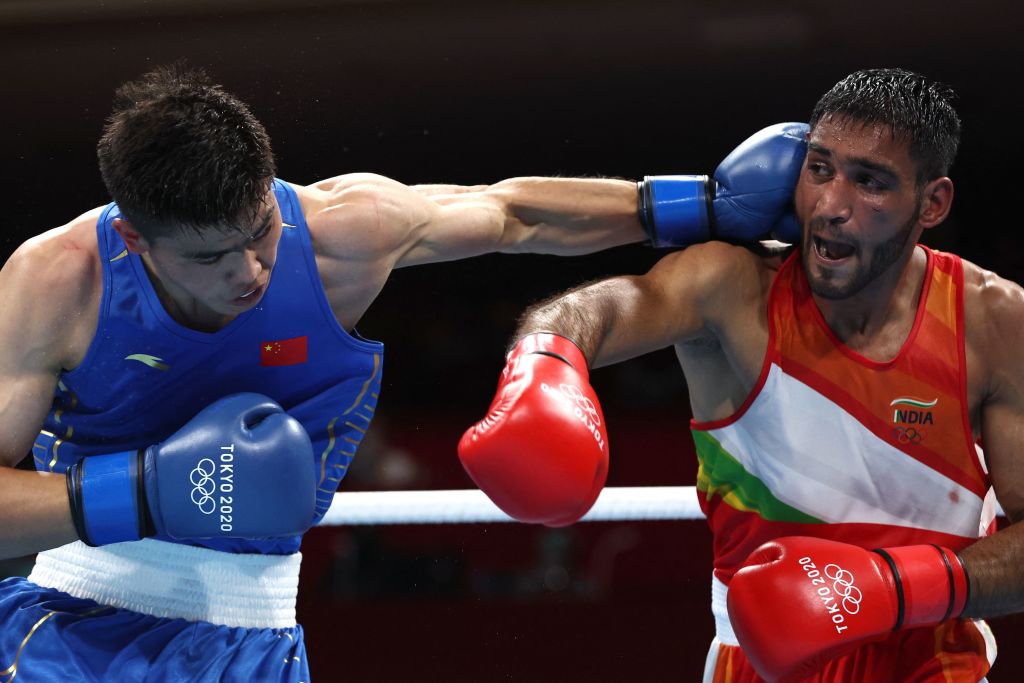The Olympic-sized difference between India and China

The Tokyo Olympic Games are over, and the Japanese people and government have heaved a sigh of relief that the spectacle passed without a major Covid-19 outbreak in the athletes’ village or another disaster. Here in India, the celebrations of the country’s first gold medal in the men’s javelin—and its best-ever medal performance at a single Olympics—have not yet subsided. But how good, really, is our best?
A decade or so ago, many spoke of India and China in the same breath. The two countries were supposedly the new contenders for global eminence after centuries of Western ascendancy, the Oriental response to generations of Occidental economic success. Some even spoke of ‘Chindia’, as if they were joined at the hip in the international imagination.
But anyone seeking confirmation that such twinning is, to put it mildly, out of place, need only look at the medal tally in Tokyo. China ranked a proud second, with 38 gold medals—one fewer than the United States—and 88 medals in total. Now scroll down, past Belarus, divided Georgia, the Bahamas and even the breakaway province of Kosovo (whose independence India does not recognise). There, in 48th place, sits India, with seven medals in all, one gold, two silver, and four bronze.
In fact, this is not a surprise. Whereas China has systematically strived for Olympic success since it re-entered global athletic competition after years of isolation, India has remained complacent about its lack of sporting prowess. China lobbied for and won the right to host the summer Olympics barely two decades after its return to the games. But India rested on its laurels after hosting the 1982 Asian Games in Delhi and is now seen as being further behind in the competition to host the Olympics than it was four decades ago.
In the run-up to the 2008 Beijing games, China embarked on ‘Project 119’, a government program devised specifically to boost the country’s Olympic medal haul (the 119 refers to the number of golds awarded at the 2000 Sydney Olympics in such medal-laden sports as track and field, swimming, rowing, sailing and canoeing and kayaking). Indians, by contrast, wonder if they will ever crack the magic ceiling of 10 medals.
China, seeing the number of medals on offer in kayaking, decided to create a team that would master a sport hitherto unknown in the Middle Kingdom. But India has not even lobbied successfully for the inclusion in the games of the few sports it does play well, such as kabaddi (a form of tag-team wrestling), polo or cricket, which was played in the 1900 Olympics and never since.
Likewise, China has developed new strengths in other non-traditional sports, like shooting, while maintaining its dominance in table tennis and badminton. India, by contrast, has seen its once-legendary invincibility in field hockey fade with the introduction of artificial turf, to the point where a bronze for the men’s team in Tokyo prompted great exhilaration. When it comes to sport, forget ‘Chindia’—the two countries barely belong in the same sentence.
What has happened at the Olympics speaks to a basic difference in the two countries’ systems. Put metaphorically, it’s the creative chaos of all-singing, all-dancing Bollywood versus the perfectly choreographed precision of the 2008 Beijing opening ceremony.
The Chinese, as befits a communist autocracy, approached the task of dominating the Olympics with top-down military discipline. The objective was established, a program to achieve it drawn up, the state’s considerable resources devoted to it, state-of-the-art technology acquired and world-class coaches imported. India, by contrast, approached the Tokyo Olympics as it had every other, with its usual combination of amiable amateurism, bureaucratic ineptitude, half-hearted experimentation and shambolic organisation.
That’s simply the way we are. If the Chinese authorities want to build a new six-lane expressway, they can bulldoze their way past any number of villages in its path. But if you want to widen a two-lane road in India, you could be tied up in court for a dozen years fighting over compensation claims. In China, national priorities are established by the government and then funded by the state; in India, they emerge from seemingly endless discussions and arguments among myriad interests, and funds have to be found where they can. China’s budget for preparing its athletes for the Tokyo games alone probably exceeded India’s expenditure on all Olympic training in the last 70 years.
So, whereas India produces individual excellence despite the system’s limitations, individual success in China is a product of the system. Indians excel wherever individual talent is given free rein. The country has produced world-class computer scientists, mathematicians, biotech researchers, filmmakers and novelists. But come up with a challenge that requires high levels of organisation, strict discipline, sophisticated equipment, systematic training and elastic budgets, and Indians quail. Perhaps tellingly, the only Indians who have attained the title of world champion in recent years have been a billiards player and a chess grandmaster.
In Tokyo, the much-favoured Indian shooters failed to win a single medal, owing to setbacks such as a malfunctioning trigger on a world champion’s pistol that could not be fixed quickly enough. The best women’s table tennis player, denied the advice of her trainer, snubbed the official Indian coach, leading to disciplinary action. Our female archer, ranked first in the world, failed to get past her qualifying round.
India’s sporting talent pool is smaller than its large population suggests; in a country of existential challenges and intense competition for every opportunity, very few feel able or inclined to devote the time needed to master a sport. The system is not designed to unearth athletic talent, and many who have it lack the health, nutrition, sporting infrastructure and training resources required to make a global mark.
India, unlike China, is a fractious democracy. China will win many Olympic medals for many games to come. But India, perhaps, might win some hearts.